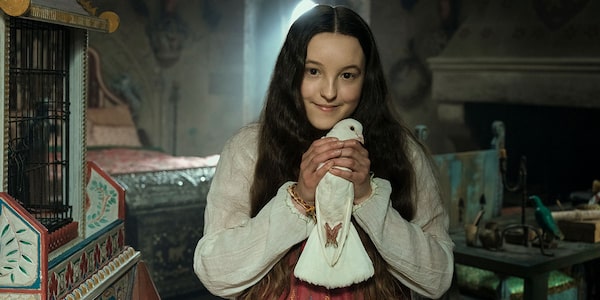
Vicky Krieps portrays Sissi in the film Corsage.Supplied
Near the beginning of Corsage, an unsettling new biopic about Elisabeth of Austria, the 19th-century empress flounces into a palace accompanied by her ladies. Clearly visible behind them in the marble entrance is a set of modern glass doors, as though the set dressers had forgotten to hang the velvet curtains that would have obscured such an obvious anachronism. But there is no mistaking the doors, nor the point director Marie Kreutzer is making: Corsage is going to acknowledge the problem of presentism, the inevitable intrusion of contemporary concerns into historical fiction.
The fall film calendar has several lush, female-centric costume dramas on offer, all of them animated by a contemporary interest in the status of women: Corsage, fresh from critical acclaim at Cannes where Vicky Krieps won an acting prize for her portrayal of the empress, known as Sissi, is showing at the film festivals in Toronto and Vancouver. So is Emily, the Emily Bronte bio starring Emma Mackey and directed by Frances O’Connor.
The Toronto International Film Festival also has Lena Dunham’s historical comedy Catherine Called Birdy, about a young woman chaffing against medieval social norms, before it goes to Prime Video. And TIFF has now premiered one of the most anticipated titles of the season: The Woman King is a Hollywood action movie starring Viola Davis as the leader of the Agojie, a female regiment in Dahomey on the west coast of Africa, during the heyday of the Atlantic slave trade in the early 19th century. It opens in theatres this weekend.
Only Kreutzer, in an art film that experiments freely with the biography of the Austro-Hungarian empress, draws our attention to the issue, but any director taking an audience back hundreds of years has got to make decisions about how true to history or how faithful to contemporary tastes she wants to be. At some point in the process that created The Woman King, everybody decided the only way this was going to work was to have the Dahomey speak African-accented English. That follows a strong Hollywood tradition that has cast everybody from ancient Egyptians to French aristocrats as English-speakers, although here a Brazilian slave trader does get to speak in subtitled Portuguese. So, suspend disbelief, sit back and enjoy the show.
A ripping yarn about powerful women, The Woman King is also, of course, anti-racist and anti-colonial. It is to the slave trade what Schindler’s List was to the Holocaust, a feel-good counter narrative of rescue and revenge that doesn’t ask audiences to think too deeply about the millions murdered or enslaved. The Agojie did exist, but as director Gina Prince-Bythewood and her co-writer Dana Stevens set the slave market on fire, their film can only lightly acknowledge that the Dahomey were slave traders, too, selling their captive enemies to the Europeans.
Davis’s Oscar-bait performance creates a classic action hero, troubled perhaps, but pure in intention. Corsage and Emily, on the other hand, are willing to let their heroines be flawed characters, convinced that the interest in their stories lies in the way a patriarchal society made room for neither their talents nor their eccentricities.

Birdy is the 14-year-old heroine of Catherine Called Birdy, an adaptation of Karen Cushman’s young adult novel about a spirited girl who rebels against her father’s attempts to arrange her marriage.Amazon Prime
Mackey’s Emily is both paralytically shy outside the family circle – her career as a teacher ends when she is found hiding in a closet – and aggressively rebellious, roaming the Yorkshire moors with her dissolute brother Branwell. Today, we might suspect the budding novelist was on the autism spectrum; in 19th-century England she was merely odd. The script gives her a passionate love affair with a handsome young curate to explain where she got the idea for Wuthering Heights, but also makes clear that her literary imagination is a crucial escape hatch in a society with little room for creative women.
The restless and melancholic Sissi, meanwhile, would be a diplomat and politician if her puzzled and condescending husband, Emperor Franz Joseph, would only make space for her opinions. Instead, at 40, she is trapped in her role as a great beauty, terrified of losing her looks, obsessed with her weight and feeding off of men’s admiration. She’s a Princess Diana-like figure and we sympathize more with her predicament than her contemporaries might have, but she is not an admirable person in any era – just intriguing and dramatic.
Another character trapped by the patriarchy is Birdy, the 14-year-old heroine of Catherine Called Birdy, Dunham’s adaptation of Karen Cushman’s YA novel about a spirited girl who rebels against her father’s attempts to arrange her marriage.
For Dunham, history is a convenient and comic whipping boy as 21st-century conceptions of 13th-century mores become the source of much laughter: too much dirt, not enough dentistry. There are many howlers in the film – Birdy has bound books centuries before they came into use – but most obviously anachronistic are the attitudes. As Bella Ramsey’s Birdy lectures one middle-aged suitor that women are not chattels to be bought and sold, she delivers a speech straight from the mouth of a 2020s teen.
Still, presentism is rather the point here, as it is in The Woman King. Balancing exoticism and righteousness, these are movies that aim to entertain with a story from long ago featuring a moral of today.
Plan your screen time with the weekly What to Watch newsletter, with film, TV and streaming reviews and more. Sign up today.